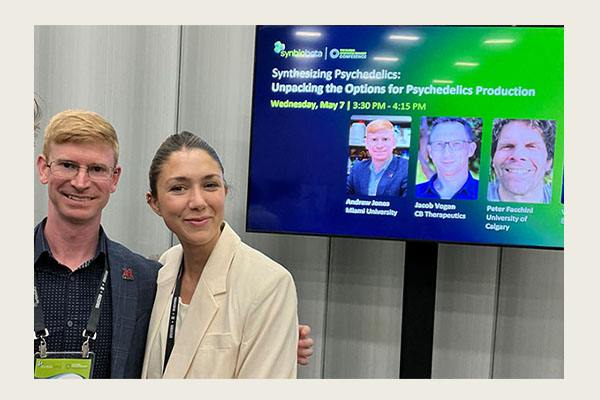Miami enters licensing agreement with EYWA Biotech
Startup company will utilize technology developed in lab of Andrew Jones, associate professor of Chemical, Paper, and Biomedical Engineering

Miami enters licensing agreement with EYWA Biotech
Jones worked with Lexie Adams ’21; Nicholas Kaplan ’22, M.S. ’22; and Madeline McKinney ’22, M.S. ’23, to engineer a strain of E. coli that is able to consume sugar and a starting substrate to produce high concentrations of psilocybin, a chemical naturally found in the mushroom Psilocybe cubensis. EYWA will use these engineered microbes in a fermentation bioprocess to produce and purify psilocybin for pharmaceutical use.
Jones has been lauded for his research in the biosynthesis of psilocybin and its use in treating addiction, depression, and post-traumatic stress disorder.
“I’m thrilled to see EYWA advancing the technology developed in my lab toward a commercial pharmaceutical product with the potential to transform treatment for a range of mental health disorders,” Jones said. “It’s incredibly rewarding to see this science move from the lab to the real world, and I’ll be closely following EYWA’s progress and cheering on their continued success.”
EYWA’s mission is to pioneer new pathways for pharmaceutical-grade psychedelic production, combining advanced biotechnology with an ethical and human-centered approach to mental health.
Licensing the technology developed by the Jones lab represents a strategic milestone for EYWA, said Paola Rodriguez, co-founder and CSO.
“It provides access to a robust microbial platform that overcomes key bottlenecks in
psilocybin biosynthesis,” Rodriguez said. “By combining our expertise in biotechnology for psychedelic neuropharmacology, medicinal chemistry, and industrial process design with his innovations, we are accelerating market entry with strength and focus.”
“At EYWA, we believe the future of mental health innovation lies in cross-border collaboration and scalable, science-driven solutions,” said Victoria Costa Paz, co-founder and CEO of EYWA. “This partnership with Miami University brings together world-class research from the U.S. with Latin America’s growing biotech talent and infrastructure. It’s a powerful example of how accessible, high-impact science can be built across regions — and scaled for global impact.”
Eywa and Jones connected at the SynBioBeta conference in 2024. Discussions continued over the next 15 months prior to the finalization of the agreement.
Adams, Kaplan, and McKinney worked in the Jones lab for 3-5 years, spending thousands of hours on research.
McKinney now works at Epic Systems in Madison, Wisconsin. The company develops healthcare software. She praised the opportunity to work in a research lab as an undergraduate, which allowed her to grow in critical thinking and mentorship while also cultivating a passion for science.
“The years I spent in the Jones lab made me an active contributor to the advancement of knowledge,” McKinney said. “I didn’t think that was possible for someone with my educational background. That is why I am still so proud of my time there today, especially knowing the work continues to be explored to help better the field of mental health.”
Like McKinney, Kaplan also completed a B.S. in Chemical Engineering and M.S. in Chemical and Biomedical Engineering while in the Jones lab.
“It is incredible to see research become commercialized, especially work that is predominantly led by undergraduate researchers,” Kaplan said. “Andrew’s commitment to undergraduate research has inspired me to continue mentoring undergraduates as a Ph.D. student at the University of Washington.”
Adams also is pursuing a Ph.D. at Stanford University after earning a B.S. in Chemical Engineering from Miami. Adams, who was named a 2020-2021 Goldwater Scholar and Astronaut Scholar, said undergraduate research was fundamental to her development at Miami.
“Not only did the experience allow me to solve real-world problems and explore new directions but also allowed me to be curious and develop a deeper understanding of biotechnology,” Adams said. “It is so inspiring to see the work continue to be useful and sought after through the licensing deals. I hope that this technology will be able to make a difference in patients’ lives.”